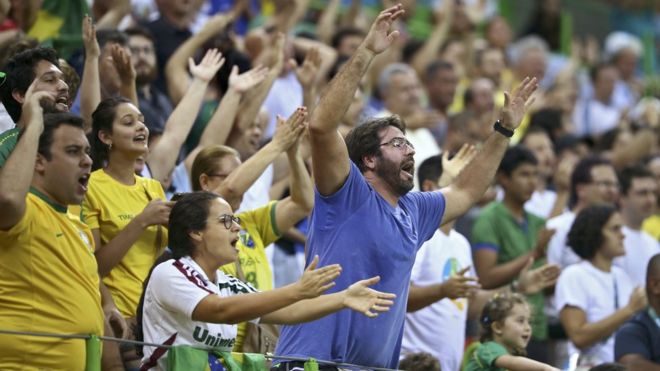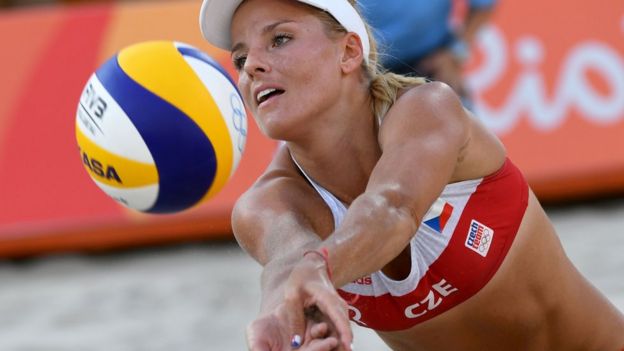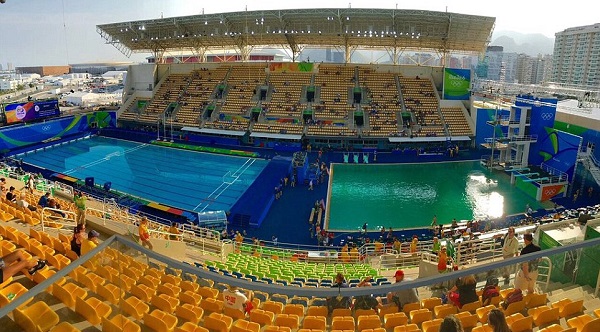
Brazilian fans for men's handball match between Brazil and Poland; fans
behavior has been criticized in the press and social networks abroad
If
at the beginning of the subject 2014 World Cup was the timid
performance of Brazilian fans, the home audience's behavior was
highlighted in the first weekend of the Olympics in Rio for the opposite
reason.
International press and publications on social networks
highlighted moments in the first days of competition in the local fans
"are treating Olympic sports as if they were in a Flamengo vs
Fluminense", as described by a text from Reuters.
14-Bis to Paulinho da Viola hymn: the 8 most important moments of the opening of the Olympics
Is
the common practice in Brazil to encourage underdogs, the already
famous cry of "Ooo Zika" to Hope Solo, goalkeeper of female US soccer
team, or the boos against Brazilian rivals in beach volleyball, the
crowd came with all the debate .
"Brazilian raucous fans a deaf ear
to the Olympic spirit," was the title Reuters text, signed by two
reporters in Rio de Janeiro and distributed to the world.
"In boxing,
judo, fencing or even tennis, Brazilian fans are treating many Olympic
sports as if they were in a Flamengo vs Fluminense, a rivalry of Rio
where passions, and spitting and eventually punches, often fly high,"
write the reporters.
The text combines the behavior in the arenas of
sports culture in Brazil - "largely defined by the country's success in
football in the past and dominated by an often jingoistic attitude
against those who do not wear local yellow" - and also by socioeconomic
public profile paying.
According to Reuters reporters, the audience of the Games mainly come from an upper middle class and rich, "used to being spoiled" and whose behavior surprises foreigners and shames compatriots as a Brazilian who said she was embarrassed by the booing the Argentine delegation during opening ceremony.
Exaggeration or part of the game?
Matt Gatward, correspondent of the British newspaper The Independent, the crowd booing overreacted to the German tennis player Dustin Brown, who had to leave the match against Brazilian Thomas Belucci after twisting an ankle.
"The Brazilian fans these Rio Games are a very patriotic class (...). There is no harm in it. That's the advantage of competing at home. But that was almost a little further on Sunday when the public on center court tennis hooted German Dustin Brown, who had fallen and sprained an ankle, which ended up taking him to the hospital, "he wrote.
In a text about the behavior of the Brazilian fans during the beach volleyball competition, Time magazine asked: "Do the sites are taking their love for the sport too far?".
The publication quoted the opening game of the Brazilian Agatha and Barbara, current world champions. After the defeat, the Hermannova and Slukova Czech complained boos coming from the stands, despite the claims of the official narrator for moderation.
"I play for ten years and never lived it. It's kind of patriotism. I think it's nothing personal against us, they just do not know the limit of what is appropriate for the moment and what is not. We also we are human beings, "said Slukova.
"That's no way to treat rivals but it can not create rules on boos -.. It is always part of the game in the sport until the Olympics," concludes the text of the magazine.
There were also episodes of boos and cries of fans at the entrance of the Argentine delegation at the opening ceremony and more sports "silent" as table tennis, horse riding and fencing.
Reaction against goalkeeper
The Brazilian fans was also a theme in the two games of the American selection of women's football. For publishing images and texts about his concern for the Zika virus before the Olympics, the goalkeeper Hope Solo became the target of chants of "Ooo Zika" in each participation in matches.
On Twitter, American fans criticized the mockery. "Dear Brazil, if you want to be taken seriously, booing and shouting 'zika' every time Hope Solo catches the ball is not helping," wrote Seanchaí user.
Nathan Fenno, American reporter from Los Angeles Times described as a "strange sound" invaded the arena of swimming when the Russian Yulia Efimova, involved in a doping scandal, took part in the qualifiers of the 100 meters breaststroke. "Booing welcomed" the athlete wrote.
"Public booing Rio Efimova as it flutters to the fullest with your swimmer (John) Gomes (Junior), who took six-month suspension for doping is ironic," he criticized also by Twitter, the user Seán Donnelly.
Desrespeitosa ou torcida de verdade? ‘Olimpíada das vaias’ repercute na mídia e redes sociais no exterior
8 agosto 2016
Compartilhar

Image copyrightREUTERSImage captionTorcida brasileira durante jogo de handebol masculino entre Brasil e Polônia; comportamento de torcedores tem sido alvo de críticas na imprensa e em redes sociais no exterior
Se no começo da Copa do Mundo de 2014 o assunto foi a performance tímida da torcida brasileira, o comportamento do público de casa ganhou destaque no primeiro final de semana da Olimpíada do Rio pelo motivo oposto.
Imprensa internacional e publicações nas redes sociais destacaram momentos nos primeiros dias de competição em que os fãs locais "estão tratando esportes olímpicos como se estivessem em um Flamengo x Fluminense", como descreveu um texto da agência de notícias Reuters.
Do 14-Bis ao hino de Paulinho da Viola: os 8 momentos mais marcantes da abertura da Olimpíada
Seja na prática comum no Brasil de incentivar azarões, no grito já consagrado de "ôôô Zika" para Hope Solo, goleira da seleção feminina de futebol dos EUA, ou nas vaias contra rivais brasileiras no vôlei de praia, a torcida entrou com tudo no debate.
"Fãs estridentes brasileiros se fazem de surdos para o espírito olímpico", foi o título do texto da Reuters, assinado por dois repórteres no Rio de Janeiro e distribuído para todo o mundo.
"No boxe, judô, esgrima ou até no tênis, os torcedores brasileiros estão tratando muitos esportes olímpicos como se estivessem em um Flamengo x Fluminense, uma rivalidade do Rio onde paixões, além de cusparadas e eventualmente socos, costumam voar alto", escrevem os repórteres.
O texto associa o comportamento nas arenas à cultura esportiva do Brasil - "em grande parte definida pelo sucesso do país no futebol no passado e dominada por uma atitude muitas vezes ultranacionalista contra quem não veste o amarelo local" - e também pelo perfil socioeconômico do público pagante.

Image copyrightAFPImage caption'Eu jogo há dez anos e nunca vivi isso', disse a tcheca Marketa Slukova.
Segundo os repórteres da Reuters, o público dos Jogos vêm principalmente de uma classe média alta e rica, "acostumada a ser mimada" e cujo comportamento surpreende estrangeiros e envergonha compatriotas como um brasileiro que disse ter ficado constrangido com as vaias à delegação argentina durante a cerimônia de abertura.
Exagero ou parte do jogo?
Para Matt Gatward, correspondente do jornal britânico The Independent, a torcida exagerou ao vaiar o tenista alemão Dustin Brown, que teve que abandonar a partida contra o brasileiro Thomas Belucci após torcer um tornozelo.
"Os fãs brasileiros nesses Jogos do Rio são uma turma bem patriótica (...). Não há mal nisso. Essa é a vantagem de competir em casa. Mas isso quase foi um pouco além no domingo, quando o público na quadra central de tênis vaiou o alemão Dustin Brown, que tinha caído e torcido um tornozelo, o que acabou o levando ao hospital", escreveu.
Em um texto sobre o comportamento da torcida brasileira durante a competição de vôlei de praia, a revista americana Time questionou: "Será que os locais estão levando seu amor pelo esporte longe demais?".
A publicação citou o jogo de estreia das brasileiras Agatha e Bárbara, atuais campeãs mundiais. Após a derrota, as tchecas Hermannova e Slukova reclamaram das vaias que vinham das arquibancadas, a despeito dos pedidos do narrador oficial por moderação.

Image copyrightTWITTERImage captionUsuários do Twitter criticaram o comportamento da torcida brasileira.
"Eu jogo há dez anos e nunca vivi isso. É um tipo de patriotismo. Eu acho que não é nada pessoal contra nós, eles só não sabem o limite entre o que é apropriado para o momento e o que não é mais. Nós também somos seres humanos", disse Slukova.
"Isso não é jeito de tratar rivais. Mas não se pode criar regras sobre vaias - é sempre parte do jogo no esporte. Até nas Olimpíadas", conclui o texto da revista americana.
Também houve episódios de vaias e gritos da torcida na entrada da delegação argentina na cerimônia de abertura e em esportes mais "silenciosos", como tênis de mesa, hipismo e esgrima.
Reação contra goleira
A torcida brasileira também foi tema nos dois jogos da seleção americana de futebol feminino. Por ter publicado imagens e textos sobre sua preocupação com o vírus Zika antes da Olimpíada, a goleira Hope Solo se tornou alvo de gritos de "ôôô Zika" em cada participação nas partidas.
No Twitter, fãs americanos criticaram a zombaria. "Caro Brasil, se você quer ser levado a sério, vaiar e gritar 'zika' toda vez que Hope Solo pega na bola não está ajudando", escreveu a usuária Seanchai.

Image copyrightTWITTER/EPAImage captionVeterana do futebol feminino, a americana Hope Solo se tornou alvo de 'bullying' da torcida brasileira após publicações sobre medo de contrair o vírus Zika no Brasil
Nathan Fenno, repórter do jornal americano Los Angeles Times, descreveu como um "som estranho" invadiu a arena da natação quando a russa Yulia Efimova, envolvida em um escândalo de doping, participou das eliminatórias dos 100 metros peito. "Vaias saudaram" a atleta, escreveu.
"É irônico o público do Rio vaiar Efimova enquanto vibra ao máximo com seu nadador (João) Gomes (Júnior), que tomou suspensão de seis meses por doping", criticou, também pelo Twitter, o usuário Seán Donnelly.





